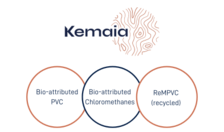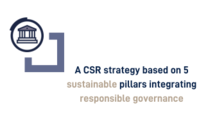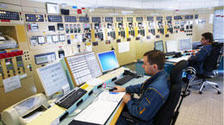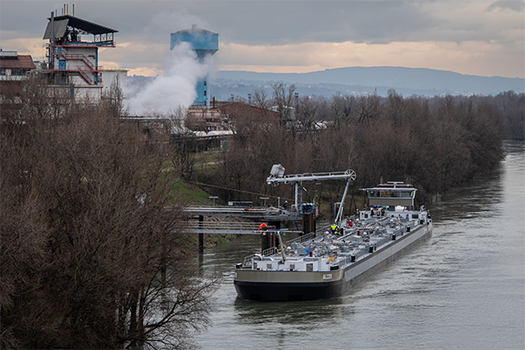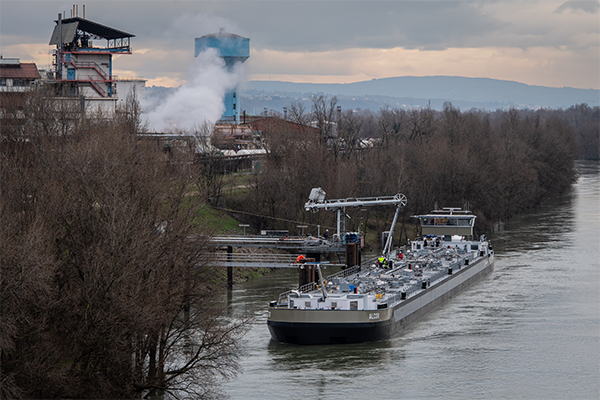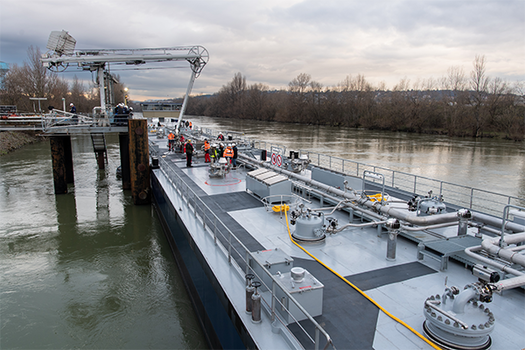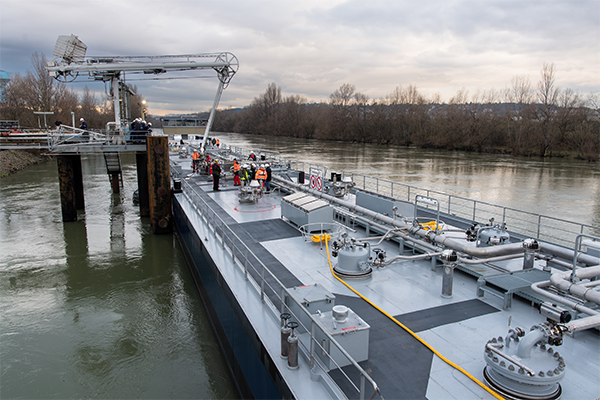Alcor’s inaugural voyage on the Rhone, Kem One’s new hybrid boat
25/01/23In January 2023, Kem One will put into service two hybrid-engine ships that comply with the new regulation on pollutant emissions. Alcor, one of them, has just made its first delivery to Saint-Fons. The company thus becomes the first shipper on the Rhône to make its fleet green for the transport of raw materials: it will avoid the emission of 2,000 tonnes of CO2 each year.
19 January 2023, Saint-Fons: Alcor, Kem One’s new generation self-propelled ship, makes its first delivery to the PVC production site. It has just sailed between the Port of Fos and Chemical Valley, powered by a hybrid diesel-electric engine. A first for a shipper on the Rhône.
©Julien Rambaud/ Kem One
This new boat, along with its twin, the Mizar, will now make the rounds between the Kem One sites in Fos-sur-Mer/Lavéra and the Saint-Fons site in the Lyon region to transport vinyl chloride (VCM), the raw material for PVC. These are the first vessels dedicated to the transport of raw materials on the Rhône to comply with the new European standards on polluting emissions in river navigation (EMNR stage V). They will reduce transport-related emissions, avoiding more than 2,000 tonnes of CO2 per year.
“For more than twenty years, river transport has been the most suitable form of transport for covering the logistics needs between our industrial sites located on the banks of the Rhône,” comments Pierre Fauvarque, Purchasing and Supply Chain Director at Kem One. “The construction of these two hybrid self-propelled vehicles is part of our approach to reducing the environmental impact of our activities, and in particular the carbon footprint of PVC. We hope to pave the way for other manufacturers in the region. ”
Built by the Dutch company Teamco Shipyard, the self-propelled tankers have been transported to the port of Marseille-Fos by a specialised semi-submersible vessel at the end of December. They are operated by CFT Gaz, a subsidiary of the Sogestran group, one of Kem One’s partners since the first CVM river transports, with whom the company has signed a ten-year operating contract.
©Julien Rambaud/ Kem One
“CFT Gaz is very pleased to be supporting Kem One in this project to reduce transport-related emissions through the operation of these two diesel/electric self-propelled units,” comments Cédric Morot-Bizot, director of CFT Gaz.This partnership is perfectly in line with the Sogestran group’s ambition to build a European group serving a more sustainable economy. ”
30 to 35% less CO2 emissions
Compared to the old boats, Kem One aims to reduce energy consumption and CO2 emissions by 30 to 35%, thanks to a system for regulating energy production. This innovative choice will facilitate subsequent moves toward other energy sources such as bio fuels, hydrogen and electricity, without having to modify the propulsion system.
The self-propelled vessels are equipped with a connection device to high-powered electrical terminals at the quayside, which will eliminate the need to use their generator, in order to avoid any emissions during the loading and unloading phases. In addition, waste water will be stored on board, treated and pumped out at the quayside in line with the "zero discharge" objective.
These vessels will ensure the long-term sustainability of Kem One’s river transport method, in order to cover the CVM needs of the PVC production sites in Saint-Fons and Balan. All this while combining reliability, safety and environmental benefits.
Support from public players in the energy transition
In its approach, Kem One was accompanied by the advice of Malcuit Transport fluvial and by the public establishment Voies navigables de France (VNF), an expert in the energy transition of the river sector, responsible for the Fleet Modernisation Assistance Plan (PAMI) and advice on activating the various national and European public aid schemes.
The design study for the two boats was financed by VNF and the PACA region (45,000 euros - PAMI). The construction of one of the two self-propelled boats will benefit from financial support from VNF and ADEME (400,000 euros - PAMI) and the solution of the hydride propulsion of the two self-propelled boats will receive support from the European Union (25% of the additional cost compared to a diesel engine, i.e. 1.22 M€ of FEDER funds investigated by the AURA Region, the managing authority) within the framework of the Rhône Saône Plan. An application has also been submitted to benefit from the national energy saving certificate scheme (CEE).

